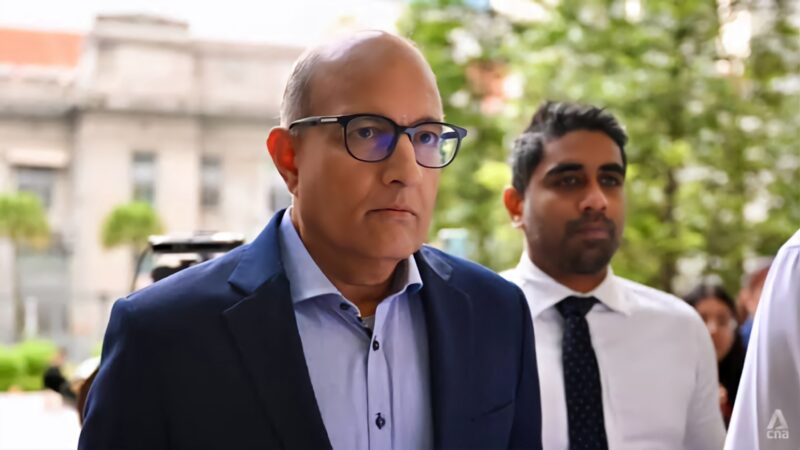Subramaniam Iswaran’s Conviction Marks a Pivotal Moment for Singapore’s Anti-Corruption Efforts and Challenges Its Image of Political Purity.
SINGAPORE, SINGAPORE- Singapore’s reputation as a bastion of clean governance has taken a significant hit following the sentencing of Subramaniam Iswaran, a former senior cabinet minister, to 12 months in prison for corruption and obstructing justice. This high-profile case, the first of its kind in nearly 50 years, has rocked the city-state and raised concerns about integrity within its government.
The Charges and Conviction
At 62 years old, Iswaran, who once held portfolios in Singapore’s home affairs, communications, and transport ministries, pleaded guilty to receiving gifts worth over S$403,000 ($311,882) during his time in public office. These gifts included tickets to prestigious events like the Formula 1 Grand Prix, a Brompton bicycle, luxury alcohol, and even a private jet ride.
In addition to receiving unlawful gifts, Iswaran also faced charges of obstructing justice, an offense which significantly contributed to his 12-month sentence. Prosecutors pointed out that Iswaran acted with deliberate intent, attempting to cover up his tracks by asking billionaire tycoon Ong Beng Seng, who is also under investigation, to bill him for a flight to Doha after realizing that authorities were probing into his associates’ dealings.
The Trial: A Blow to Integrity
During the trial, Justice Vincent Hoong, who presided over the case in Singapore’s High Court, emphasized the grave nature of Iswaran’s actions, highlighting how they undermined public trust in the country’s political system. Justice Hoong rejected claims of Iswaran’s remorse, pointing out that the former minister initially expressed confidence that he would be acquitted of all charges.
“In his letter to the prime minister, he rejected the charges and expressed his strong belief that he would be acquitted. Thus, I have difficulty accepting these as indicative of remorse,” the judge stated.
Iswaran’s crimes, including accepting multiple lavish gifts, were deemed a clear abuse of his political power, and Justice Hoong noted that public servants in high positions have a greater responsibility to uphold integrity and avoid any perception of corruption.
The Aftermath of the Case
The fallout from Iswaran’s conviction has sent shockwaves through Singapore’s political landscape, where the People’s Action Party (PAP), the long-dominant political party, has prided itself on maintaining high standards of ethics and transparency in government. However, this case, along with other recent political scandals, has raised doubts about the PAP’s commitment to upholding these values.
The former transport minister’s sentence is expected to be served at Changi Prison, a facility that also houses death row inmates. Conditions at Changi are known to be harsh, with inmates sleeping on straw mats in poorly ventilated cells, a stark contrast to the opulence and privilege Iswaran enjoyed during his time in office.
While Iswaran will begin serving his sentence on October 7, 2024, the case has ignited a national conversation about the wealth and privilege of government ministers in Singapore. Notably, Singapore’s lawmakers are among the highest-paid in the world, with some ministers earning salaries exceeding S$1 million annually ($758,000). The government has long defended these high salaries as a measure to deter corruption, a stance that is now being questioned in the wake of Iswaran’s downfall.
Public Response and Political Impact
The trial and sentencing have undoubtedly tarnished the image of the PAP, which has ruled Singapore for decades. Singapore prides itself on its strict anti-corruption laws and public officials’ transparency, but Iswaran’s case is a rare reminder that even in a nation with some of the world’s highest governance standards, corruption can still seep into its political ranks.
Eugene Tan, an associate professor of law at Singapore Management University, noted that the public had expected a strong message of zero tolerance from the courts. “It’s not a significant sum over his years of service, but on his salary, he could have very well afforded not to,” Tan said, underscoring the unnecessary nature of Iswaran’s acceptance of such gifts.
The public’s disappointment in Iswaran is compounded by his long tenure in government and the privileged position he held within the PAP. This scandal, alongside previous corruption allegations involving other ministers and a public outcry over high living costs, has created a perception that the country’s elite may not be as incorruptible as once believed.
Other Political Scandals in Singapore
Iswaran’s case is not an isolated incident. Singapore’s political elite has faced other scandals in recent years. In 2023, a corruption investigation into two other ministers involved in real estate dealings eventually cleared them of wrongdoing, but the public’s confidence in the system was already shaken. Additionally, Singapore’s Parliament Speaker resigned the same year after an extramarital affair with another lawmaker was exposed, further fueling speculation about the moral integrity of those in power.
The last significant corruption probe involving a Singaporean politician occurred in 1986 when then-National Development Minister Teh Cheang Wan was investigated for accepting bribes. Teh committed suicide before charges could be brought against him. Prior to that, in 1975, former Minister of State for Environment Wee Toon Boon was sentenced to 18 months in prison for accepting over $800,000 in bribes.
Implications for the People’s Action Party
The People’s Action Party has long maintained a political monopoly in Singapore, thanks in part to its squeaky-clean image. However, with the next general election due by November 2025, Iswaran’s scandal is a significant blow to the party’s reputation. The PAP’s share of the popular vote has already been declining in recent elections, and the Workers’ Party, the leading opposition group, has grown in influence despite facing scandals of its own.










Join our Channel...